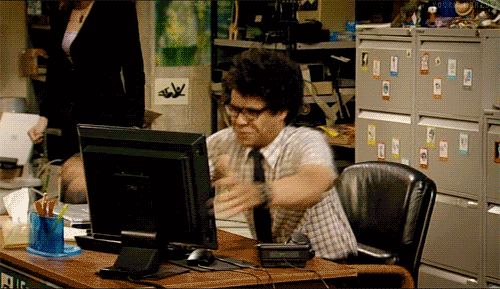WHAT I LEARNED WHILE WRITING MY FIRST FEATURE FILM
Ever since I was little, I’ve always loved writing. Also, I’ve always loved films. For way too long, I didn’t know you could actually study filmmaking. But when I learned you could, I automatically knew what I wanted to be when I grew up: a scriptwriter. Throughout my life I’ve written many short films, a TV show (that hasn’t been produced) and even helped many friends with their projects. It was only a couple of weeks ago, however, that I finished writing my first feature film script. I’ve been writing this script on and off for about three years, so yeah… it was definitely about time.
So… what have I learned while writing my first feature film?
What has this experience been like? What have I learned about myself and “the process” while writing my first feature film? Writing is hard, especially for those of us who do it as a side project (which I’m guessing is most of us). It’s quite a lonely process that requires a lot of discipline. It also really makes you sit down with all your insecurities. Here’s a small sample of things I kept telling myself while writing: “No-one will want to read this”, “There is no way a producer will be interested in this”, “This planting is too gratuitous”, “This pay-off is not satisfying enough”, “Is this actually boring? Or have I just read it too many times?”, “What you’re saying is unimportant” and of course the concise, yet effective: “This is bullshit”. Lucky for me, I was able to move this not-so-kind voice in my head and finish the first draft of my script.
I thought I’d share what I’ve learned about writing and about myself throughout this journey, just in case it can help you in any way. Please note, I’ve only just finished the first draft of my script. There’s still work to be done on it, so the journey is far from over. This is my own personal project and, as of yet, it has no producers attached to it or anything. It’s just something I’ve been working on for a long time. If you’re struggling through your own personal project, I hope this post helps you see that you’re not alone. Those voices in your head telling you you or your work is not good enough are something we all live with. Basically, I hope this post helps you keep doing what you love. Keep doing the work!
1. Make writing part of your routine
Writing is indeed a muscle (“No shit, Sherlock.”). But seriously, writing used to come easy to me in school. Now… call it age, call it being an adult with a full full time job… it’s hard. I’m sure it didn’t help that I took a break from writing either.
For this same reason, you shouldn’t wait for inspiration to strike in order to write. Make sure you schedule time to do it. Have your own routine. For me, I schedule Saturday and Sunday afternoons to write. My routine includes lighting a candle and making some tea. Some days I would only do rewrites because I couldn’t seem able to write anything new. Other days I just managed to get 2-3 pages that I would delete the next week. Some rare times, however, I would write up to 20 pages a day. It might not be much to some of you, but it is to me. So yeah, I’m sure those “twenty-page” days wouldn’t come to me unless I had sat down every single weekend to do the work. So I suggest you do the same. If you seem blocked, try a writing exercise. Just tell yourself you’ll write something (anything) only for five minutes. Sometimes, starting is the hardest part, so that will help you get going. I’m sure after those five minutes are over, you’ll probably be ready to keep writing.
Personally, my next goal is to get into the habit of writing every day. Even if it’s just for ten minutes. Even if it’s something stupid. I’ll write something every day. Anything. You never know when it might come in handy.
2. “Between thought to page lies a lifetime” (The Velvet Underground)
My dad loves this quote. Let me tell you: I thought of this quote every single day of writing this script. Writing is funny because sometimes I’d have a scene I was less excited about come to me easily and become one of my favourite parts to write. Other times, that scene I was idealising in my mind I discovered didn’t quite work for the story. Or it was just bad. Maybe it’s my inner perfectionist talking, but I’m sure many of you writers out there understand.
My advice? Get through it. Write those scenes (the good and the bad). You’ll get back to them at some point and rewrite them as needed, but for now, get them over and done with. Don’t get stuck. Write them, move on and confront them again once you’re done. I have made a note myself of a few scenes I believe are not working in the script. However, I’m not telling anyone about my thoughts, because maybe it’s just me. I’ll wait until I can share the script with someone I trust. If they see the same issues, I’ll rewrite. Who knows? Maybe a fresh pair of eyes will allow me to see that the issue is somewhere else in the script entirely.
Maybe it’s that scene I really love that is actually the one that is not working. You know the one I’m talking about. That first scene you saw in your head? The one that sparked that idea for the whole story? What then? Ah, my friend. Kill your darlings, they say. I haven’t faced this situation just yet as no-one has reviewed my script. However, I’ll let you know when I do. I bet that’s a whole new post entirely.
3. You will probably hate (most of) what you write
I’m not happy with my script. I just see every single mistake and all the tools I used to write it. I imagine it being like a coder who’s able to see the messy backend of a website. Or like a graphic designer noticing that double space. But you know what? These feelings are normal. That’s why Anne Lamott talks about the “shitty first draft”. Martin Scorsese said about film making: “If you don’t get physically ill seeing your first rough cut, something is wrong.” And I guess it’s the same with your first draft.
Hey, I’m learning to deal with it. The thing is, the day I finished writing my script I watched Jonah Hill’s “Mid90’s” (2018) and I started crying. That film was so good… so perfect… I was honestly kind of embarrassed by what I wrote. That imposter syndrome kicked in. “What was I thinking by writing this shitty script? Why did I have this need to write it? It’s not a story worth telling…” all these thoughts (AND MANY MORE) started racing through my head.
You know what? I’m pretty sure my script is not as great as “Mid90’s”. But it’s there. It’s mine. And I’ll make sure it becomes the best version of itself it can be. Also, remember: hating is not cool. Not even with your own work.

4. Be very clear about your structure when you start writing
I think this is especially important for anyone, but especially for beginners. I am not talking about having a small sheet of paper where you know where each of your film acts end. Seriously, this is not even the skeleton of your script. Knowing your plot points is more like the “cartilages” of your script. You still need the bones, muscles and all that. So my recommendation, I don’t care how boring or redundant it feels like, start by writing your synopsis. Then expand it into a treatment. Make it as long as possible and as elaborate as possible. Make sure you see your characters’ story arcs. Nofilmschool.com also has a great blog post titled “How do Professional Screenwriters Outline Their Projects?“. It’s a great guide for anyone if you’re not quite sure where to start.
5. All ideas have been done. But they have not been done by you
If we wanted to very briefly talk about “Brokeback Mountain” (2005, Ang Lee) we could say it’s a story about “forbidden love”. Correct? Can you imagine how sad it would have been if Annie Proulx, who wrote the original short story for “Brokeback Mountain” had decided not to write it because “forbidden love” was already explored by Shakespeare in “Romeo and Juliet”? We wouldn’t have been able to read that beautiful story and the movie would have not been made. That would have been a cultural loss for everyone because, despite both titles dealing with forbidden love, I believe “Brokeback Mountain”’s character depth, social relevancy and impact were (ARE!) incredibly important. Maybe even more so that Shakespeare’s play.
All this to say, almost everything has been done before. So don’t be too preoccupied with being “original”. Instead start by asking yourself: what can you say about that? What else can you add to that conversation? Find your answer and run with it.
6. Don’t dwell on your mistakes
I’m not expecting my first script to be a work of art. Hey, maybe it turns out my script actually is bad. Ok, so? I can imagine very few filmmakers are happy with their first script. As I see it, I got this one out of my system and I am already working on ideas for my next one. Don’t overthink it. Learn from your mistakes and just keep swimming. We got this. Lucky for us writers, we have it easy. All we need is pen and paper. Go, write!

These are the six lessons I have learned about myself and about writing while writing my first feature film. I hope this post helps you in some way. I’m sure putting these feelings into writing will help me with my next film script. Or maybe not. Maybe a new set of issues will arise. In that case… I’ll face them head on and write a new post for your guys. In the meantime, keep writing, keep creating. Talk to you soon.